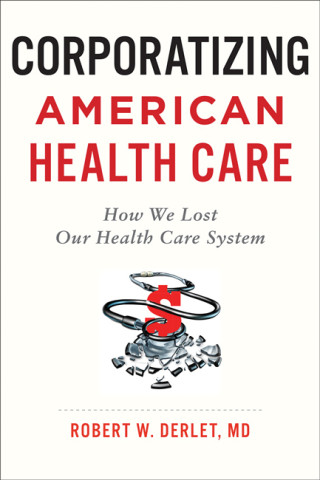Tracking the evolution of medical care from an individualized small cottage profession to a giant impersonal corporate industry costing Americans over $3 trillion each year.
Over the past three decades, the once-efficient American health care system has evolved into a complex maze of monopolies and a racket of bureaucratic checks, approvals, denials, roadblocks, and detours. This shift has created a massive and at times redundant workforce that frustrates patients, as well as physicians, nurses, and administrative staff. Health care costs the United States over $3 trillion each year and...
Tracking the evolution of medical care from an individualized small cottage profession to a giant impersonal corporate industry costing Americans over $3 trillion each year.
Over the past three decades, the once-efficient American health care system has evolved into a complex maze of monopolies and a racket of bureaucratic checks, approvals, denials, roadblocks, and detours. This shift has created a massive and at times redundant workforce that frustrates patients, as well as physicians, nurses, and administrative staff. Health care costs the United States over $3 trillion each year and consumes over 18% of the country's gross domestic product. That's more than $11,000 for each person in the country each year—more than double what it costs in most Western European countries to deliver equal or even better care.
In Corporatizing American Health Care, Robert W. Derlet, MD, traces the progression of health care policy in the United States. How, he asks, has US health care transformed from bedside medicine—a model of small practices and patient-focused care—into corporate medicine, which prioritizes profit and deals with both patient care and outcomes as billing codes? Arguing that the US Congress is the root of the problem, he describes how Congress has failed to enact legislation to prevent corporate monopolies in the health care industry. Instead, corrupted by large campaign donations and corporate lobbyists, Congress has crafted loopholes benefiting corporations and harming people.
Drawing on his decades as a practicing physician caring for thousands of patients, as well as his university and medical school teaching experience, Derlet follows changes to both policy and practice across many sectors of health care. Scrutinizing how hospitals work, he also takes a hard look at high prescription drug prices, unresponsive insurance companies, problems with the Affordable Care Act, the growing medical implant device industry, and even nursing homes. Finally, he explains why the dominance of corporations and their lobbyists over health policy means that we now pay more for our care and our medications but have less choice both in what doctors we see and in what drugs we take. Breaking down the complex ABCs of health care to reveal the unscrupulous practices of the health care industry, Corporatizing American Health Care is perfect for both students and general readers who want to understand the changes in our system from the perspective of an actual doctor.






